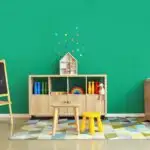Teaching children to recognize words and improve their vocabulary and spelling can sometimes be much easier said than done.
Children can be very easily distracted, and can very quickly find themselves getting bored when learning, so the best way to teach them to recognize words, and to improve their reading comprehension is to use some word games!

There are hundreds of thousands of different word games that can be played in the classroom, but because of this, it can be very daunting to find the perfect ones to play among your students.
Luckily, you have come to the right place, because today we are going to look at 20 of the very best word games for kids that have actually been recommended by teachers across the world! Let’s dive right in!
1. Hangman
There are perhaps few word games quite as iconic as Hangman, so of course, we could think of no better game to start off with!
In case you haven’t played the game, the objective is for the students to complete the word before the titular ‘Hangman’ can be, well, hanged!
The students will take turns to suggest letters that may be used to make up the word, and if they get one right, it is added to the word, making it easier to then guess the rest of the word.
Every time a wrong answer is given, another part of the hangman is drawn, and he moves ever close to his doom!
This game helps children to understand the importance of vowels and consonants and helps them to internalize the spellings of many words.
2. Create A Wordsearch
Wordsearches are another tried and trusted word game that can be great for children to work on their reading comprehension and spelling.
Luckily, creating a word search is incredibly easy, as there are numerous word search generators found online that you can use to create a simple word search of any size.
Word searches are great because they help children to work on their spelling skills, by recognizing challenging words based on how they are spelled.
3. Catch The Balloon
This is a very simple game that is very easy to set up. All you need to do is inflate a balloon, and then on the surface of the balloon, write a number of different words all across it.
You can choose how difficult the words are based on the age of the children.
Toss the balloon to the children, and then when one of the children catches it, they will have to read out the word that is facing them at that moment, before then using it in a sentence.
This game keeps the children engaged and active, while also giving them an incentive to use their minds creatively and intelligently.
4. Sight Word Slap
This incredibly fun game encourages the children to use their minds quickly and helps them to work on their reading comprehension.
In order to play the game, you will want to cut out some short words that you can lay out on the classroom floor in front of the children.
Divide the children into pairs, with each child competing against the other child in the pair!
Have the two children sit beside the words, on opposite sides. Once the children are ready, call out one of the words on the floor.
From here, the children will have to quickly process the word and match it to the visual representation on the floor. The first child to ‘slap’ the word with their hand, is the winner of that round!
This game really encourages the children to develop their reading comprehension, while also providing them a great outlet!
5. Secret Words
Another simple game that tests the children’s skills is ‘Secret Words’.
To play this game, you will need to provide the children with coded messages that spell out a single world using symbols as representatives for letters.
The representative symbols will be those that start with the corresponding letter. Think ‘E’ for ‘Elephant’, and ‘D’ for ‘Dog’.
Let’s say you wanted the children to spell out the word “Cat”. On the code message, you would include an image that represents ‘C’, such as ‘Car, a word for ‘A’, such as ‘Apple’, and a word for ‘T’, such as ‘Tooth’.
Leave the children to decipher the message, and it will really encourage them to work on their spelling skills!
6. ‘Hink Pinks’
This is a word game that is just as fun as its crazy name would suggest.
The objective of this game is for the children, in small groups, to come up with rhyming word phrases like “flat hat”, which they should then use other words to describe.
In this case, “Flat hat” would be described as “pancake cap”. It is up to the other children to work out the rhyming words using these as a clue!
This is a game that will really get the children thinking, and help to make them more creative.
7. Stick Words
This simple matching game is great for solidifying the spellings of specific words in the minds of the children.
The game is very simple, easy to prepare, and allows the children to work on their fine motor skills.
Grab some popsicle sticks in pairs, and write on both of the sticks a distinct word.
It should be written across both sticks, so that the top and bottom sticks both have half of the same word.. Write a few words on a few pairs, and then shuffle the sticks up, and lay them out for the children.
It is up to the children to sort through the pile and find the sticks that correspond with one another.
This helps the children to recognize the spelling of the words, while also helping them to memorize the shapes of each letter, which gives them better reading comprehension and spelling skills.
8. ‘The Minister’s Cat Is…’
This is actually a very old game that deserves to see a resurgence in the classroom!
The game itself is very simple, but it really challenges the children to work on their memorization of the alphabet, word types, and even their memory retention skills.
To play the game, start off a sentence with “The Minister’s Cat Is…”, and from there, each child, in order, takes it upon themselves to add an adjective to describe the cat, creating a list, from child to child.
Each word must follow, alphabetically from the last, and whenever a child goes to add a word, they must recite all words from before theirs!
This is a really hilarious game that encourages the children to work on their memories, while also helping them to memorize the alphabet.
We recommend dividing the children into smaller groups, so that the list of adjectives does not get too hard to remember.
9. Sentence Jenga
Jenga is a really fun game to play with the kids, because not only is it heart-racing and exciting, but it also helps the children to develop their fine motor skills to carefully move the pieces without toppling the tower.
You can adapt the game to be a perfect word game by writing words directly onto the pieces, which the children must then combine together to create entire phrases or sentences as they pull them out.
This word game is great because the children will not even realize that they are learning, because they are having too much fun playing Jenga and creating fun and wacky sentences!
To Wrap Up
There you have it! Creating word games is easily the very best way to encourage a group of young children to work on their reading comprehension as well as their spelling.
Of all of the various games that can be found across the web, these are easily amongst the very best, so why not try one of them out with the class?
We made sure to choose games that were easy to set up and play, allowing the kids to learn in no time at all!
If you’ve got students struggling with reading, take a look at these resources for reading intervention.
- Homeschooling In High School: Pros And Cons - February 24, 2024
- How Do I Withdraw My Child From School To Homeschool? - February 23, 2024
- How To Not Go Crazy Homeschooling Kids: A Guide For Frazzled Parents - February 22, 2024









Leave a comment